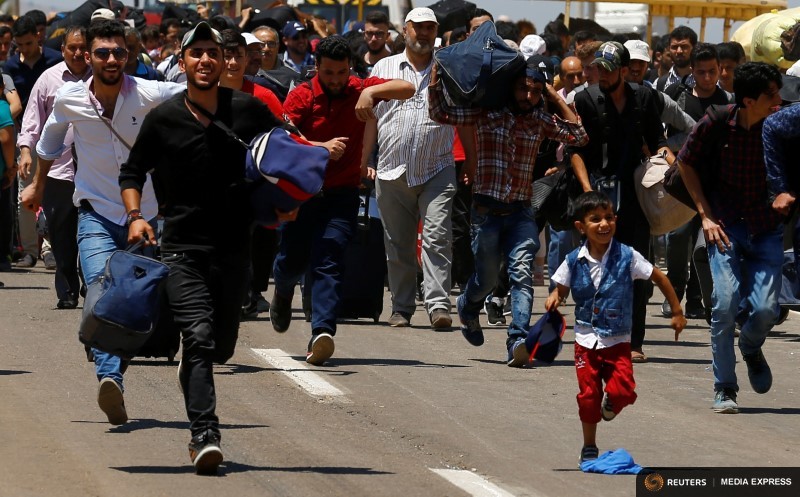
Carrying suitcases, shopping bags and toddlers, thousands of refugees walked back home into Syria from Turkey on Thursday ahead of the Eid festival that marks the end of the Muslim holy month of Ramadan.
Turkey has taken in some 3 million Syrian migrants since the start of civil war in 2011, making it home to the world’s largest refugee population.
Now Ankara is giving Syrian refugees the right to return to Turkey within a month if they want to go home to celebrate the Eid al-Fitr holiday.
Some said they wanted to start again in their homeland, and would return within the month if it did not work out, while others said they wanted to return to Syria for good, citing the difficulty of finding employment in Turkey.
“One day you can find a job, the other day you can’t,” said Sevsen Um Mustafa as she walked toward the border crossing with two daughters in tow. “Sometimes they make you work but they don’t pay. Even if they do, it’s not enough.”
“Even smelling the soil of Aleppo is better than here,” said the former Aleppo resident. “I’d rather die there because of war than here because of starvation.”
The majority of Syrian refugees in Turkey live outside the government-built camps and struggle to make ends meet as the cost of food, rent and clothing usually exceeds their incomes.
The government, which tightened its border security after a 2016 deal with the European Union to stem illegal migration, estimates it has spent some $25 billion on housing the refugees.
BORDER CROSSING
Authorities did not give any figures on how many Syrians have returned so far. A Reuters witness said at least 3,000 people crossed on foot through the dusty Cilvegozu border crossing into Syria during several hours on Thursday.
Ankara introduced work permits for Syrians in 2016 but many, like 22-year-old Muhammed Ali, said opportunities are scarce.
“Even if I worked for the whole month, I’d have 200-300 liras ($57-$85) left over after paying the rent,” said Ali, who was heading back to his hometown of Afrin, in northwest Syria after four years of working as a textile laborer in Istanbul.
“I had no rights of leave, no insurance. I was miserable.”
The offer to return applies to Syrian nationals with valid travel documents who cross through the Cilvegozu and Oncupinar border gates, authorities said. The Eid al-Fitr holiday begins on June 25. Those who wish to return can do so until July 14.
Anyone who comes back after that will be treated as new arrival and subject to the regular immigration process, a local official at the Hatay governor’s office said.
Facing criticism from Western allies that it was too slow to stop the flow jihadis from Syria, Turkey has fortified its 900 km (560 miles) border with fences, minefields, ditches and a wall. In August 2016 it launched a military campaign in Syria and drove Islamic State militants from its border.
Authorities say thousands of Syrians have since returned to Syrian towns freed from Islamic State. Still, Turkey’s biggest cities and border provinces still host hundreds of thousands of refugees.
Images from Turkey’s state-run broadcaster TRT also showed hundreds of refugees waiting near Oncupinar border crossing in the southeastern Turkish province of Kilis.
(Writing by Humeyra Pamuk; Editing by David Dolan and Alison Williams)





























May God give them peace. They are in my prayers.
Eid Mubarak, lovely article.